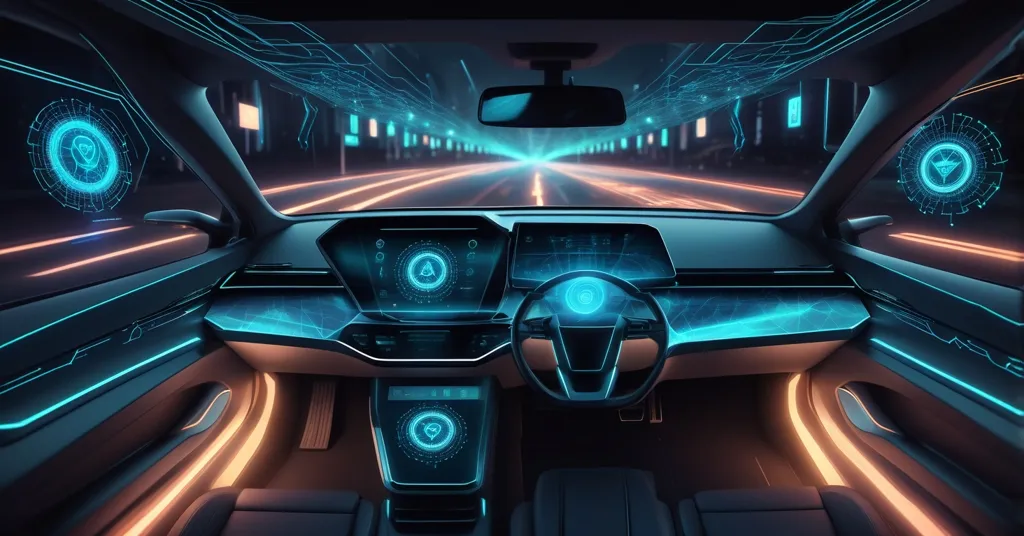GM Unveils Gemini AI for 2026 Vehicles: Privacy Risks and Blockchain Opportunities Explored

GM’s Gemini AI Hits the Road in 2026: Smart Cars, Privacy Puzzles, and Blockchain Potential
General Motors (GM) dropped a bombshell at its GM Forward event in Lower Manhattan, announcing the integration of Google’s conversational Gemini AI assistant into every vehicle—gas and electric—starting in 2026. This ambitious move, paired with plans for a hands-off, eyes-off driver-assist system by 2028, positions the Detroit automaker as a serious contender in the tech-driven mobility race, challenging Tesla and Mercedes head-on. But beyond the shiny tech, questions of reliability, privacy, and potential intersections with blockchain loom large.
- Gemini AI Launch: Rolling out in 2026 across all GM vehicles via Android Automotive.
- Key Features: Climate control, messaging, route planning, and real-time web access.
- Future Vision: Hands-off, eyes-off autonomy by 2028 with lidar and centralized computing.
Unpacking Gemini AI: A Smarter Ride?
Starting in 2026, every GM vehicle will come equipped with Gemini AI, embedded through the Android Automotive operating system—a Google-designed software platform tailored for car infotainment, much like Android on your smartphone but built for the dashboard. This isn’t just a voice-activated toy; it’s a full-fledged assistant designed to pre-condition climate settings (think warming up your car on a freezing morning before you leave the house), draft messages, plan optimal routes, and pull real-time data from the internet for traffic updates or nearby stops. It’s also set to be the default voice recognition system, leveraging what’s known as natural language processing—tech that lets the AI understand and respond to human speech in a conversational, almost human-like way. For more details on this groundbreaking integration, check out the announcement of GM’s Gemini-powered AI assistant rollout.
GM is throwing down the gauntlet, claiming Gemini outshines competitors like Tesla’s xAI Grok and Mercedes’s ChatGPT integration. Dave Richardson, GM’s Vice President of Software and Services, didn’t hold back on the hype:
“They’re flexible in how you speak to them…so overall you’re getting a better, more natural experience.”
Translation: GM thinks Gemini can handle your mumbled half-sentences or regional slang better than the other guys. But let’s pump the brakes for a second. Generative AI, the kind powering Gemini, is notorious for occasional hiccups—think chatbots spitting out nonsense or misinterpreting critical input. GM itself admits there’s uncertainty about how reliably this tech will perform in real-world driving scenarios. If Gemini glitches while adjusting climate settings or mishears a command at 70 mph on the interstate, it’s not just a bug—it’s a damn liability. GM better have rigorous testing in place, because a flub here isn’t a cute quirk; it’s a potential safety hazard.
Privacy Pitfalls: Who Controls Your Data?
With connected cars becoming data-hoovering machines, privacy is a glaring concern. GM is quick to reassure drivers that they’ll have full control over what data Gemini can access or use. On paper, that’s a win, especially for those of us who champion data sovereignty and user empowerment. But let’s not kid ourselves—promises of privacy from big corporations often come with fine print longer than a highway. The automotive industry has a sketchy track record; data breaches and unauthorized sharing of driver info have made headlines in recent years. If GM’s system gets hacked or if “opt-in” data collection becomes a sneaky default, trust could evaporate faster than a Bitcoin bull run.
Execution is everything. A centralized AI system, no matter how well-intentioned, inherently clashes with the decentralization ethos we hold dear. It’s a “trust us” dynamic that leaves a sour taste for anyone who’s been burned by corporate overreach. GM needs to back up its words with ironclad safeguards, or this could turn into another surveillance nightmare dressed as convenience.
Autonomy Ambitions: Hands-Off by 2028
Beyond the AI assistant, GM is gunning for a bigger prize: true autonomy. By 2028, they plan to debut a hands-off, eyes-off driver-assist system, kicking off with the Cadillac Escalade IQ, their flagship electric vehicle. This isn’t your dad’s cruise control; it’s a push toward self-driving tech, powered by lidar—Light Detection and Ranging, a system that uses laser pulses to create detailed 3D maps of a car’s surroundings, far surpassing traditional cameras or radar in precision. Pair that with a new centralized computing platform, and GM is betting this combo will boost safety and convenience, narrowing the gap with Tesla’s long-standing lead in autonomous driving.
CEO Mary Barra and Chief Product Officer Sterling Anderson framed this as a game-changer, and it’s hard not to get a little excited. If pulled off, it could redefine how we interact with vehicles, turning them into rolling offices or lounges. But the road to autonomy is littered with challenges—technical, regulatory, and ethical. A single high-profile failure could set public perception back years, and GM’s timeline feels aggressive. We’re rooting for disruption, but skepticism is warranted until they prove they’ve got the kinks worked out.
One neat touch is the integration with OnStar, GM’s in-car concierge service. Gemini AI will sync with OnStar, and for owners of OnStar-equipped vehicles dating back to 2015, the AI upgrade will be available over-the-air through the Google Play Store. This nod to older models shows GM isn’t just pushing new sales—it’s adapting to a software-driven world where updates keep tech relevant. It mirrors the adaptability we admire in decentralized systems, hinting at a future where vehicles might even support third-party, open-source apps. Now that’s a disruption we’d cheer for.
Why Crypto Enthusiasts Should Care: Blockchain on the Horizon?
For those of us in the Bitcoin and blockchain space, GM’s pivot to connected, software-heavy vehicles screams opportunity. While there’s no mention of decentralized tech in their roadmap, the focus on data control and over-the-air updates lays fertile ground for innovation. Imagine a world where your car’s AI logs interactions on a tamper-proof blockchain, ensuring transparency and privacy. Or consider secure, decentralized identity protocols that let you prove ownership or share data without exposing your entire digital life. These aren’t pipe dreams—projects like Ethereum’s smart contracts could automate insurance claims based on AI-collected crash data, cutting out middlemen and reducing fraud.
Then there’s payments. What if your vehicle could handle tolls, parking, or EV charging via instant, private transactions on Bitcoin’s Lightning Network? Bitcoin’s security and growing adoption make it a prime candidate for such microtransactions, though I’ll play devil’s advocate here: Ethereum’s smart contract versatility might edge it out for more complex automotive use cases like subscription services or tokenized vehicle ownership. Tesla flirted with Bitcoin payments in the past—GM could take it further by embedding crypto-native solutions into their ecosystem. It’s not on their radar yet, but as champions of effective accelerationism, we’d love to see them push these boundaries.
Decentralized data solutions could also mitigate the privacy risks inherent in connected cars. A blockchain-based system for firmware updates could ensure no backdoors or malicious code sneak in, while tokenized access could let drivers share specific data (like driving history for insurance) without handing over the keys to their entire profile. GM’s centralized approach feels like a half-step; true empowerment would mean leaning into decentralization, not just paying lip service to control.
Risks and Challenges: Progress with a Warning Label
Let’s not get carried away with the shiny possibilities. GM’s plans are ambitious, but they’re not without glaring risks. Generative AI’s unpredictability is a massive red flag—look at countless examples of chatbots giving wildly incorrect info or failing under pressure. In a driving context, a misheard command or buggy adjustment could spell disaster. Picture this: you’re cruising down the highway, ask Gemini to tweak the AC, and it decides to crank the heat to 90 degrees because it “thought” you said something else. Funny until it’s not. GM’s transparency about these concerns is refreshing, but they’ve got to deliver solutions, not just disclaimers.
Privacy remains the elephant in the room. Even with driver control, centralized systems are a juicy target for hackers or overzealous data brokers. A breach exposing your driving habits, location history, or personal convos with Gemini would be catastrophic. And let’s not forget the autonomy push—hands-off tech sounds futuristic, but a software glitch or lidar misread in a split-second decision could turn deadly. GM’s playing in high-stakes territory, and public trust will hinge on flawless execution.
From a disruption standpoint, we’re all for GM shaking up the status quo. Vehicles as intelligent, connected platforms align with our vision of tech empowering individuals. But if privacy gets trampled or reliability falters, this could backfire spectacularly. Will GM’s innovations truly liberate drivers, or just pave the way for more corporate oversight under the guise of convenience? That’s the million-Bitcoin question.
Key Takeaways and Burning Questions
- What is GM launching with Gemini AI in 2026?
GM is integrating Google’s Gemini AI assistant into all vehicles, gas and electric, using the Android Automotive system to manage tasks like climate control, messaging, and real-time route planning. - How does Gemini AI compare to Tesla and Mercedes offerings?
GM boasts Gemini’s natural language processing beats Tesla’s xAI Grok and Mercedes’s ChatGPT in flexibility and user experience, though on-road reliability remains unproven. - What are the privacy risks with GM’s connected vehicles?
Despite promises of driver-controlled data access, centralized AI systems pose risks of breaches or misuse, especially given the auto industry’s spotty history with data security. - What’s GM’s plan for autonomous driving?
By 2028, GM aims to introduce a hands-off, eyes-off driver-assist system with lidar tech, starting with the Cadillac Escalade IQ EV, supported by a new centralized computing platform. - How could blockchain or Bitcoin fit into GM’s future?
Blockchain could secure data and updates in GM’s ecosystem, while Bitcoin’s Lightning Network might enable private, instant payments for services like charging or tolls, and Ethereum’s smart contracts could automate complex interactions like insurance claims.



